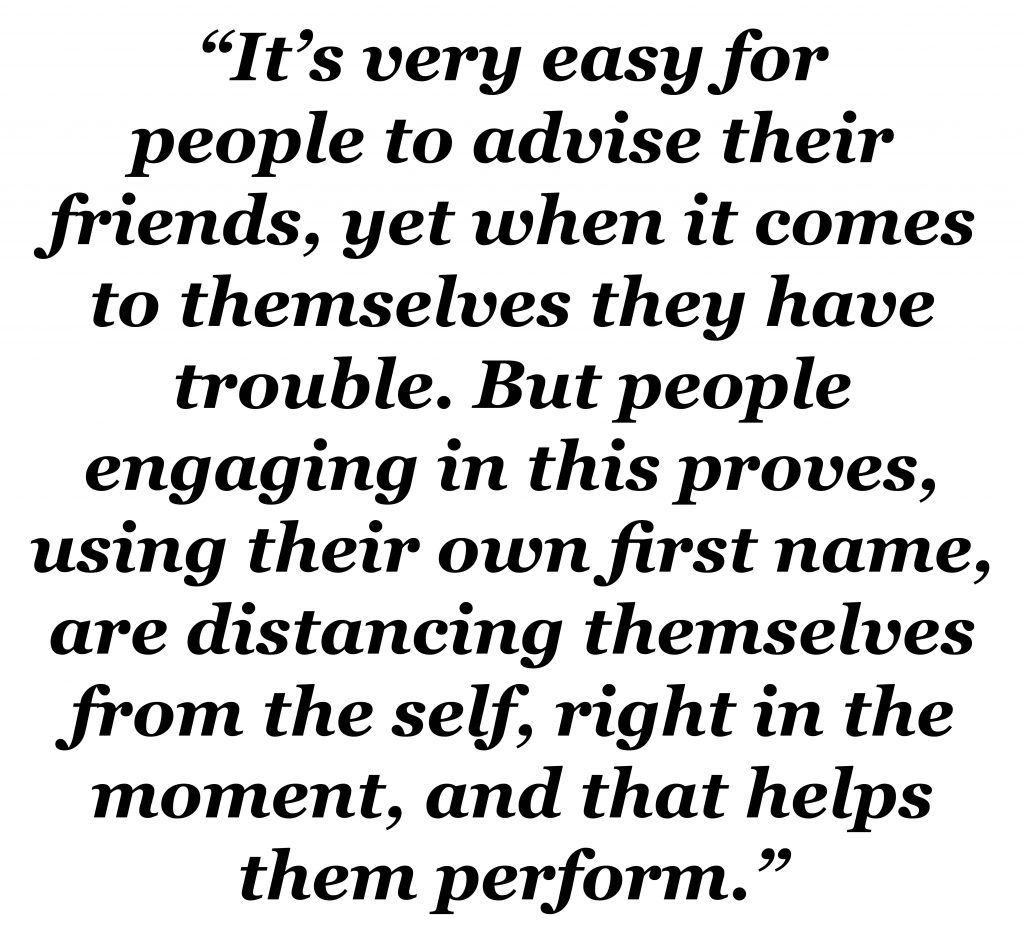Did you know, every second of the day, we talk to ourselves? In fact, that talk, or “inner voice” precedes or forms what we actually say aloud? As soon as we turn off that alarm clock in the morning, it starts. The self talk.
Last week, I wrote about the huge impact of language on our behavior. Specifically, language can set the stage for a successful (or not) health and fitness program. The words we use, how we use them and how we apply them and in the present tense, the more likely we will reach our desired goal or outcome. Our words can dictate our success.
Our language, our tone and style get a lot of practice. Because we talk to ourselves…constantly. Have you heard these words before…?
“I will never get enough sleep.”
“I look bad in jeans.”
“I can’t wait fitted tops because of my muffin top.”
“Why can’t I get up 15 minutes early to exercise?”
“I don’t like how my boss/husband/friends talk to me.”
“I feel like a chauffeur.”
“I hate my job.”
“I wish I looked like that.”
Sadly, according to behavioral psychologists, as much as 77% of our self talk is negative and works against you. It takes as many as 20 positive statements about yourself to counteract even one negative personal statement, according to Michele Cederberg, Certified Exercise Physiologist. Cederberg says, “Researchers have learned that the human brain operates much like a personal computer. Once information is imprinted on the disk, the only way to change the information is to erase it or replace it. Otherwise, the computer will keep repeating what you “pre-programmed” into it. “I’ll never be fit.” Or “Why can’t I figure out how to make exercise a priority?” pervades many self talk dialogues.
It comes as no huge surprised that as a nation we have a tough time taking care of ourselves. According to the Centers for Disease Prevention and Control, 80% of Americans do not get adequate exercise, enough sleep or eat for optimal health. There are a list of reasons. One big one: our inner voice.
We all have an inner voice. For some of you it may sound kind of hokey. Well, it is real and it is true. Our inner voice, or self talk, is what we “say” BEFORE we speak aloud.
After researching a plethora of work on this subject, I learned an individual’s inner monologue varies greatly from person to person. Some self talk in full sentences; others think only in single words. Some visualize; others think in actions.
Why in the world is this important to your health and fitness? Because it can make or break whether you achieve your health and fitness goals. In a word: it means a healthy life or not. Longevity or not. And, last, self love or not.
While some may believe they don’t “deserve” to spend time on themselves, others maybe believe since their past fitness programs haven’t worked, why would this one? Self-talk can be super-confidence boosting and lead to major successes. Or, it can lead you down a spiraling path of failures. Remember the language we use inside our heads and aloud have implications for success.
Dr. Michael Gervais, Ph.D., a sports psychologist for DISC Sport and Spine Center, says while most of us want to grow and improve in various aspects of our lives, that growth isn’t always easy because we are in a battle between old habit (mind and action) and our desired new set of habits. One of those habits, Gervais contends, is our self-talk. “Our inner dialog, both verbalized and private, is how we make sense of the world.”
Scientists who study the inner voice say it is created in early childhood during the toddler years. The non-stop talk takes place out loud and is a sort of road map for them. Their voice directs them to play, build, run, and sound out words. The scientific pioneer Lev Vygotsky called this dialogue “private speech” and believes it comes from social dialogs with parents which, in later childhood, becomes internalized as inner speech. Or, yep, your inner voice.
This self-talk stays with us throughout life. It is such an intimate part of our lives and so constant, says British psychologist Charles Fernyhough, that it can be considered thought itself. Fernyhough explained that even Socrates believed thought came from “the talk which the soul has with itself.”
For those of you parents out there wondering about childhood development issues, Dr. Laura Berk, Ph.D, a distinguished professor of psychology at Illinois State University is a star you may want to explore for your next book club. Berk led a team of child psychologists to study the inception and effects of children’s self-talk, and studied how impactful the exchange is between teachers and the student at the earliest part of our lives. A positive teacher can influence the child’s behavior well into adulthood through their language, thereby influencing the child’s self-talk. For example, Berk found a well-taught and cared for child will say to herself, “you can do it – try again” when faced with a challenge, while by contrast an angry and abrupt teacher or caregiver can set a child up for self-defeating self-talk. Sadly, this same child is prone to becoming an inefficient self-guider, getting upset at themselves and failing to master the challenging task.
Through self-talk, children plan out their make-believe creatures. Berk found the more children self-talk during play, the more likely they are to carry out such a strategy into adulthood. This sets the stage for a lifetime of focused attention, organizing, and self-regulation. Berk says, “Children who talk to imaginary friends engage in more self-talk as adults and that makes them more self-controlled.” Self-talk gives children a psychological distance from their everyday lives. That distance, Berk says, gives them the psychic space they need to gain control over their own impulses.
Psychologist Ethan Kross, author of many works on the inner voice, found that how people conduct their inner monologues, or “private speech” has an enormous effect on their success in life. Furthermore, he found that if you talk to yourself with the pronoun (I, for example), you’re likely to fluster and perform poorly in stressful situations. On the other hand, address yourself by your first name and your chances of being successful at the task at hand are very good.
In his studies at the Emotion and Self Control Laboratory he directs at the University of Michigan, Kross found that using one’s first name in your private talk (instead of “you” or “me”) minimizes social anxiety and the fear of being evaluated in a social context. He says first name self-talk shifts the focus away from the self and allows people to rise above their innate egocentrism.
Using the first name not only disables social anxiety before stressful events but even afterward when people tend to evaluate their own performance. In his study, Kross asked 89 men and women to give a speech about why they were ideally qualified to land their dream job. Each participant was given five minutes to prepare. Half were instructed to use their given name. Those in the pronoun group wound up anchored in anxiety, apt to see the task as impossible. “How can I possibly write a speech in five minutes?” was a typical comment. Those who used their names felt less anxiety approaching the task and felt highly confident. For example, “You can do it, Ethan,” was a typical exhortation in a run up to a speech versus “I can do it.”
Even more telling was afterward. Those using their name performed better on the speech (judged independently) and engaged in far less reflection after it. They also experienced less depression and felt less shame. Kross says, “When dealing with strong emotions, taking a step back and becoming a detached observer can help.” He added, “It’s very easy for people to advise their friends, yet when it comes to themselves they have trouble. But people engaging in this proves, using their own first name, are distancing themselves from the self, right in the moment, and that helps them perform.”

Dr. Eric Moser, a neuroscientist and clinical psychologist at Michigan State University, and Kross obtained brain scans that self-distancing through self-talk bestows wisdom. They monitored students’ brains during MRI scans while the students were advised to self-talk either in the first or the third person. The brains of the students who talked to themselves in the third person looked a lot like the students who were asked to give advice to friends. Kross says we are better at dealing with other people’s problems than with our own. Self-distancing can bring clarity in thinking about any social conflict.
Why not try this approach with your health and fitness?
Sadly, many scientists believe that individuals suffering from depression will normally be found to have a nasty dialogue with themselves. “I am stupid” and “I’m not good enough” are common internal monologues found in those suffering from depression. It is also possible, they believe, that withdrawing from social interaction leads to a greater dependence on internal processes, or even that negative thoughts breed the need to withdraw from society.
The area of our brain responsible for when we speak aloud is also responsible for our inner voice. According to Dr. Sarah Fox, studies have found people tend to perform worse on tasks which require planning if their inner voice is suppressed while performing the task. Similarly, Fox found inner speech can have a motivational quality while, when suppressed, can have a negative effect not only on our language but on the outcome of our tasks.
So what does this mean for you? And what can you do to check in with and turn around your inner voice?
This is your journey. You are beautiful and accomplished and are loved. You choose your path. Some suggestions, based on these scientific studies,xa are:
- Talk to yourself in the first person.
- Begin with the end in mind.
- Avoid “should” and “I’ll try” using “I choose” and “I will”
- Be kind to yourself and focus on your messages to yourself
- Take away the absolutes: Change “I want to lose 10 pounds” to “Exercise and healthy eating will help me live longer”
If you find yourself with negative self talk: PAUSE. Recognize you are going down a potentially destructive road. Choose 3-5 positive attributes about you. Like, I am a great organizer, I play killer ping pong, my sister said I look nice today, I prepared a meal for a family in need, Alexandria’s trees this year are stunning and colorful, etc.
And, as always, just breathe…



